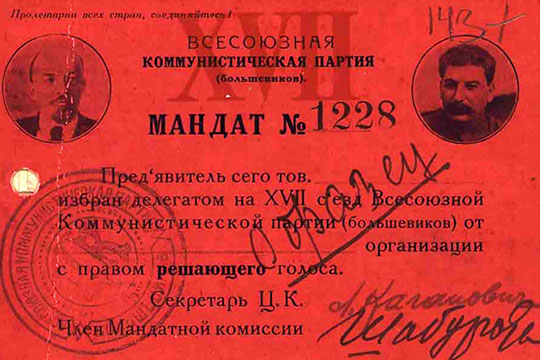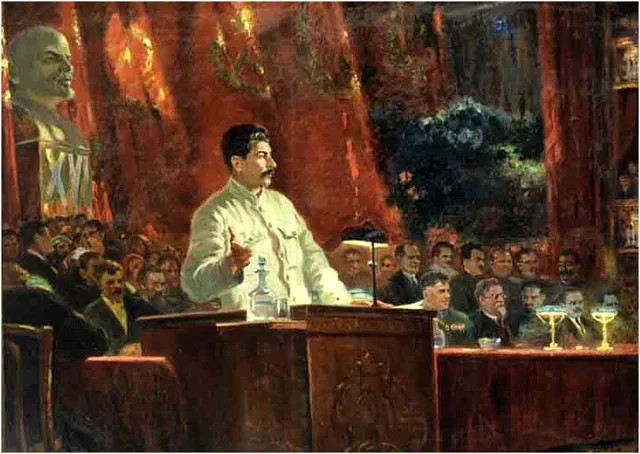In the period from January 26 to February 10, 1934 the 17th Congress of the CPSU (B.) Was held in Moscow, which, according to the plan of its organizers, was to become the apotheosis of the totalitarian system that had been established in the USSR by that time. However, despite all the efforts of the Soviet newspapers, dubbed it the “Congress of Winners”, this name did not take root, and was supplanted by another, which sounds like “Congress of the Shot”, for which there were very good reasons.
Congress turned into a propaganda action
The entire agenda of the 17th Congress of the CPSU (B.), The opening date of which forever entered the history of the party, was devoted to a report on the victories it achieved during the first five-year plan. In addition, another plan for the development of the national economy was adopted, covering the period from 1933 to 1937. This was, in fact, a large-scale propaganda action, the task of which was to officially declare the victory of socialism in a particular country, won under the leadership of I.V. Stalin.
At the evening meeting of the 17th Congress of the CPSU (B.), Held on January 5, 1934, representatives of several production groups arrived among the delegates, among whom were the envoys of the Tula arms factory. Having reported on their labor victories, which was an obligatory element of the scenario established in those years for all political events, the gunsmiths handed Stalin a sample of the newly developed Sniper rifle. Having picked up a gift from the Tulaks, the head of state, with general applause that met any of his actions, sent his weapons to the hall, and, as if jokingly, took aim at the delegates, which caused an even greater surge of applause.
Fulfilled Prophecy
Later, recalling this episode that occurred at the 17th Congress of the CPSU (B.) In 1934, many saw it as a prophetic meaning. To verify their correctness, it is enough to cite the statistics published by N. Khrushchev 22 years later from the rostrum of the 20th Congress, of the same Communist Party, which he led after the death of Stalin.
The new general secretary said that out of the total number of deputies of the 17th Congress of the CPSU (B.) - “Congress of the Winners”, in the following 2-3 years, 1108 people were arrested and sentenced to long terms of imprisonment, and 848 were shot. All, without exception, were charged with the allegedly carried out anti-Soviet activities. Among these people should be added five more victims of the mass terror unleashed in the country, who did not want to voluntarily surrender to the executioners and literally on the eve of the arrest committed suicide.
Congress preceding mass repressions
Needless to say, all these people in the 50s were rehabilitated "for the lack of corpus delicti". So, the 17th congress of the CPSU (b) was popularly called the "Congress of Shot Victors". From the materials of the criminal cases found in the archives, it is clear that the reprisals were often repaired immediately against numerous groups of repressed. For example, more than half of the congress delegates were shot within 8 days.

The impetus for the intensification of repression in the country at that time was the murder of a prominent party leader, the first secretary of the Leningrad Regional Committee of the CPSU (B.) S. M. Kirov, committed on December 1, 1934. According to modern researchers, the organizer of the crime was directly Stalin. It is believed that it was necessary for him to strengthen the allegedly ongoing struggle in the country with the enemies of the people, but in reality for the physical destruction of both representatives of the political opposition and all those who could express dissatisfaction with the established regime.
Genocide of own people
The tragic fate of the delegates to the 17th Congress of the CPSU (B.) Is in many ways natural. It was the result of the party’s general line, which built a policy of accelerated industrialization of the country on the blood of millions of innocent people. It is known that since the beginning of the 30s a whole social class became the victim of mass repressions - the Russian peasantry, forcibly driven into collective farms.
The most successful part was declared “fists” and deported, while the rest were turned into cheap and disenfranchised labor, which was obliged to feed the country. The urban population lived in constant fear of accusations of sabotage and anti-Soviet activity. In the country, in fact, the genocide of their own people was carried out. Despite this, at the 17th Congress of the All-Union Communist Party of Bolsheviks, the praises addressed to the “wise leader and teacher,” Comrade Stalin, were constantly announced.
Unfounded rumors
Speaking about the events of those ancient years, one should dispel the myth that has been firmly established over the past decades. We are talking about completely unfounded rumors, according to which in 1934, at the 17th Congress of the CPSU (B.), Delegates attempted to express distrust of Stalin in view of the results of his policy.
In the post-perestroika period, Russian and foreign media repeatedly discussed a similar version, suggesting that it was the criticism voiced at the congress that aroused Stalin's anger and provoked subsequent mass repressions. However, a detailed study of archival materials, which had by then become public knowledge, showed that there was no real anti-Stalinist demarche at the 17th Congress of the CPSU (B.) In 1934.
Suppression of intra-party opposition
As the materials from which the secrecy stamp was finally removed, the situation prevailing among the deputies was fundamentally different from that which prevailed four years earlier at the 16th party congress. The sovereignty of Stalin that had been established by that time had served to completely eradicate the inner-party opposition that had manifested itself in previous years. Despite the fact that there were extremely negative consequences of the forced collectivization of agriculture, as well as overly hasty methods of industrialization, no one dared to speak openly about them from the rostrum of the congress.
Warnings made four years earlier about the possibility of the detrimental consequences of such a policy were no longer mentioned at the 17th Congress of the CPSU (B.), And former opposition leaders such as A. I. Rykov, G. I. Zinoviev, L. B. Kamenev, N. I. Bukharin and a number of others made speeches of repentance and vied eulogized the successes of socialism. As history has shown, in the future this did not help them avoid a court trial under article 58 of the Criminal Code of the RSFSR (counter-revolutionary activity), which was very popular in those years, and capital punishment for actions allegedly aimed at undermining the Soviet state.
Stalin's Report
The main event of the congress was the speech of JV Stalin with the report of the Central Committee of the All-Union Communist Party of Bolsheviks on the results of the work done over the past five years. Having outlined the achievements of Soviet industry and agriculture in vivid colors, he did not fail to dwell on the grave crisis that, according to him, was experienced by bourgeois states that were doomed to inevitable collapse. At the same time, Stalin emphasized the possibility of an early start of a world war. His performance, as expected, was constantly interrupted by "stormy applause, turning into a standing ovation."
Speech by K. E. Voroshilov
After him, various speakers rose to the podium, covering certain aspects of the current policy. However, the general leitmotif of their speeches was enthusiastic assessments of Stalin's speech. In this regard, it should be emphasized the speech of Voroshilov at the 17th Congress of the CPSU (b). In it, he very figuratively described the invaluable contribution that their “leader and teacher” enriched the theoretical treasury of Marxism-Leninism. Voroshilov further told the world that “immersed in an impasse of insoluble contradictions” world imperialism in every possible way indulges brutal fascism, hoping with its help to establish its rule.

However, all his attempts are doomed to failure, since the USSR is a country of victorious socialism, capable of stopping any enemy machinations. Whatever plans world imperialism makes, the Soviet Union is always ready to give it a proper rebuff. In this regard, the speaker emphasized that, having fulfilled such a high mission, the first state of the workers and peasants in the world was becoming an eyesore in the eyes of presumptuous imperialism and should be ready to engage in decisive battle with it.
Voroshilov’s speech was repeatedly interrupted by the applause of delegates who were ready to rush into battle at least at that moment. But they did not have such an opportunity. Long before the real enemy invaded the borders of our country, most of them were counted among his accomplices and executed with the full approval of the masses, for whose happiness they stood up from the rostrum of the 17th Congress of the CPSU (B.).